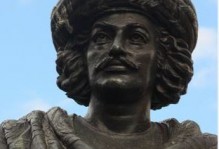Diary of an IAS Officer : From Fine Wine to Potable Water
Editor’s Note: Ferrying around 3.7 lakh litres of potable water over 200 km, India’s first water train whistled into Rajkot railway station on May 2, 1986. A city was saved from evacuation due to paucity of drinking water. Mr CK Koshy, IAS (author of this article), was then the Relief Commissioner of Gujarat State and was pivotal in making this happen. A gold medalist from University of Kerala, Mr Koshy joined the Indian Administrative Service in 1968 and retired as the Additional Chief Secretary of Gujarat. He was known as a no nonsense administrator and the state’s best bet to handle a crisis. Despite all the challenges of a civil servant, he never let his sense of humour desert him. This is visible in apt measure in this article. Photo Courtesy : Indian Express
In September 1985, as Joint Managing Director of the Gujarat Industrial Investment Corporation (GIIC), I was hosting a delegation from a European country at one of the more prominent hotels in Bombay. The well-appointed and upscale setting of a five-star hotel was far removed from the dusty environs of the back waters of rural Gujarat which till then had consumed most part of my career first as a sub divisional magistrate and then as the district magistrate/ collector. The comparison between Managing Director (MD) and District Magistrate (DM) was quite stark. The MD talked of state of the art 8 lane highway, while the DM would keep track of a rickety approach road being constructed under the government works programme. The MD would talk of multi million business deal, the collector had to ensure that the local women Self Help Group did not go out of business. The MD would be in a three-piece suit talking to business leaders, the collector in jeans and his shirt sleeves rolled up would spend his day inspecting food for work programs. The MD would concern himself with the chill in the seminar room, while the DM lost his sleep over the status of repair of the government milk chiller. The MD was envy of his colleagues, with the DM his colleagues empathised.
MD, GIIC is a rather powerful man and I was enjoying the trappings of power and visibility. However unlike in fairy tales, there is no phrase called” lived happily ever after” in the civil service. The Murphy law ‘if anything that can go wrong, will go wrong’’ sooner or later catches up with you. In my case it was the drought in Saurashtra.
In the middle of me clinking wine glasses with the high and mighty at the hotel in Bombay, I received a message that I am required in Gandhinagar urgently and was directed to meet the Chief Secretary (CS) of the State. The CS was a battle hardened sharp, dour man who wasted no words in preliminaries. He informed me that I was transferred to the newly created post of Relief Commissioner, that I was to take over right now as the Chief Minister ‘’desired’’ that I begin to work in my new post with immediate effect. The word ‘desire’ in civil service takes an entirely different meaning than what the Oxford Dictionary will tell you. It simply means, get on with the job and please ask no questions. It was clear that my recently stitched pin striped suits had to be send in storage for few years to come. So, in sync with the “glorious uncertainties” of our service, I was back to square one, arranging fodder for cattle in Saurashtra, the still unfinished wine glass would have to wait!
So, the newly appointed Relief Commissioner started his work. He was the port of call for everything which sounded even remotely like ‘drought”. I soon realised that it was me or no one, who had to ensure that drinking water reached thousands of parched villages where lakhs of my country men/women waited patiently for the sight of the water tanker makings its way to their village. In such a massive mobilisation, you can never win if God is not in your team. With weight of such a huge responsibility weighing on my shoulders I went about my job with a prayer on my lips. There were moments of uncertainty, moments of despair and moments when nothing seemed to go right. Someone in these trying times had to persevere and keep the government implementation machinery steady with a brave face, and in this case the onus fell on me.
Handling the drought demanded every skill that the Service had trained me for. The working hours stretched for 16 to 18 hours a day, as me and my team arranged the logistics, monitored water movement by train and trucks while being well aware that if we slipped, lives of millions of human beings and cattle was at stake. There was no margin for error.
I had taken the Relief Commissioner assignment when the rains failed in 1985, and to the bad luck of my state and for me, it failed in 1986 and 1987 as well. Such successive failure of rain had not happened in recent history. The dreaded “Murphy’s Law” was keeping my company.
The cattle fodder was down to critical levels given the failure of rains. By a formal notification, grass used as fodder, was declared as an essential commodity and its movement was regulated by the state government. I remember the utter disbelief on the face of family and friends from green water rich Kerala when I shared this fact with them.
In the service the challenges come at scale. I had 17 districts (90% of districts) under severe drought. This meant 15574 villages (80% of the villages) in the State had no assured supply of water. By the summer of 1987, I had to open cash for work programme for 20.56 lakh drought effected people across the state. I was responsible for ensuring that these people got paid on time, pumping enough food grains into the public distribution system and ensuring transportation of water in severely affected villages was also part of my job description. As we were getting this under control, it was decided by the state government that part of the wages in the relief works were to be given in form of grains. Implementing this across the length and breadth of the state was no less daunting than the drought itself.
We grasped at desperate measures and from that desperation came innovation and that latent Indian trait of jugaad was on hand. Very often the only source of water was located 50 to 60 kms away from the drought-stricken villages. When the fleet of water tankers owned by Govt was fully deployed, we pressed private tankers into service. When even that source was exhausted, we purchased large plastic water tanks and tied them to trucks to ensure that water reached villages. It was a war like situation, and I was the commanding officer with my ammunition fast running out.
If all this was not enough, Rajkot city, a bustling town in Saurashtra of almost a lakh of people, faced the prospect of total evacuation as it had completely run out of drinking water. For the first time special tube wells were dug in and around cities in the south of the State and the Railways arranged to run “water special” rakes to bail out the city.
For the very first time in the history of Gujarat Secretariat, we acquired computers to manage the crisis and so was born what is now known as the celebrated e-governance programme of Gujarat state. The computers came as desperate bid to manage the ever-increasing logistical nightmare on the ground and not as part of a grand design in administrative reforms.
After three years of continuous drought, the rain Gods relented and the Relief Commissioner gave a sigh of ‘relief’. It was time for retrospection. Me and my team had pulled of something incredible, the water crisis had been managed well. Many factors contributed to what we could achieve. There are three important lessons to be learnt from this experience.
First, the successful management of the unprecedented drought was possible because it became a nonpartisan people’s movement. A disaster of this magnitude cannot be handled by the government alone. It is to the credit of the Government in power and the Opposition that no political points were sought to be scored, and no reputation was sought to be tarnished. It was a people’s war against a natural calamity.
Secondly, we were fortunate to have at the helm an outstanding Revenue Minister and a tribal Chief Minister sensitive to the deprivation of the people. Between them they forged a leadership which, while handling the political fallout, left the officials to work insulated from any political sniping.The bureaucracy-political leadership relationship thus forged was perhaps the finest example of a mature democracy in action. In 1987, after the state had received ‘normal’ rainfall, the Revenue Minister spoke in the Legislative Assembly on the role of the bureaucracy in fighting drought. In a gracious gesture he placed on record the thanks of the people of Gujarat for the service rendered by these selfless officials.
Thirdly, the network of NGOs operating in the state was leveraged to the maximum. At times of disasters, well-meaning NGOs with the highest motives often run from pillar to post because the state apparatus is not geared to utilise their services. Gujarat has a long history of outstanding work done in the social sector by NGOs. Government, therefore, reached out to them in a well calibrated response. An office headed by a senior officer was opened exclusively for coordination of Voluntary Agencies. This Office became a clearing house of information as to what type of assistance was required in which district, thus preventing overlap and duplication of effort. The office also assisted NGOs in claiming their subsidies in time. Consequently, the effort of the NGOs was optimised. The cattle wealth of Gujarat was saved primarily due to the work of the NGOs in running cattle camps and in the excellent coordination between the Govt. relief machinery and the NGOs.
The unfinished wine glass left at the Bombay 5-star hotel that evening of September 1985 still stands on the bar table, as the soulful voice of Lynn Anderson plays in the background.
I beg your pardon,
I never promised you a rose garden.
Along with the sunshine,
There’s gotta be a little rain sometimes.
When you take, you gotta give, so live and let live,
Or let go.
I beg your pardon,
I never promised you a rose garden.
As for Murphy, he lived with me for the 35 years of service life, getting me into unforeseen situations, some of them I will relate to as this diary progresses.





